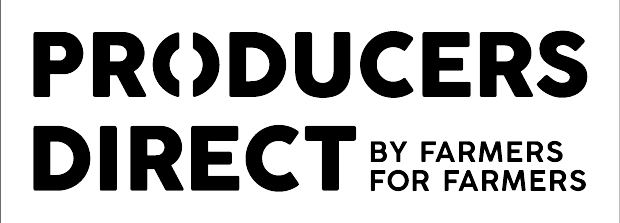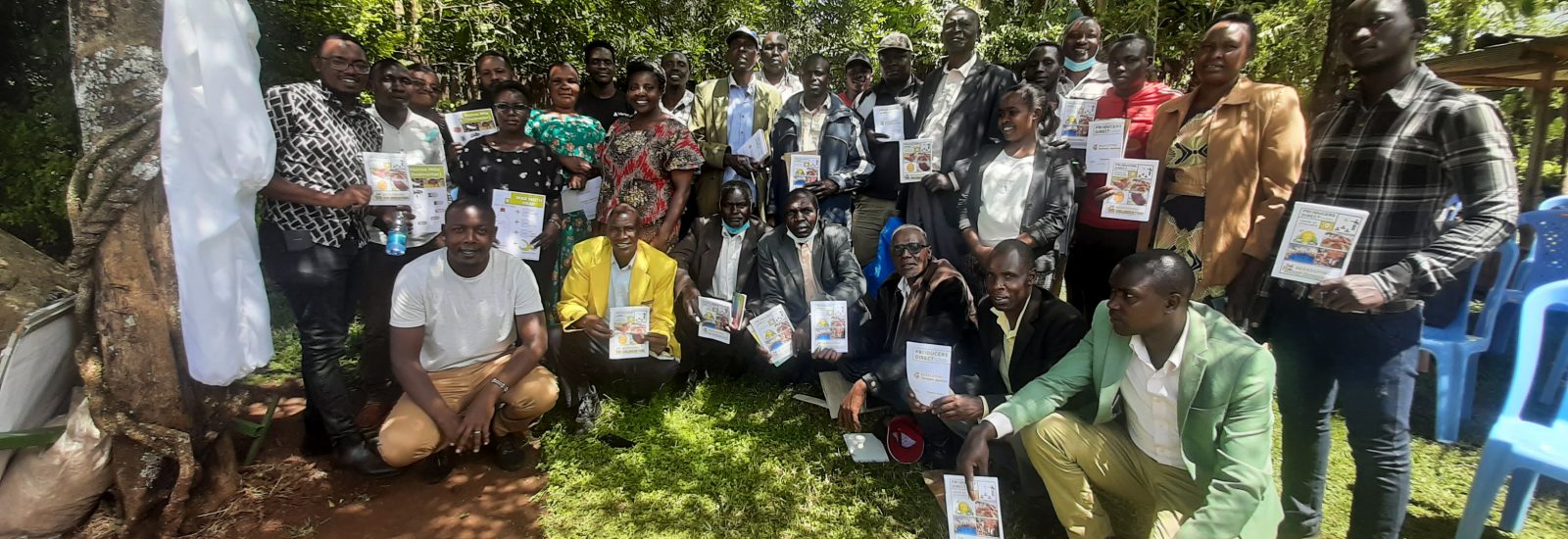At the core of Producers Direct’s model is its Centre of Excellence network, a farmer-run enterprise hosted by a smallholder producer organisation. Our goal is for each CoE to serve as a ‘one stop shop’, providing support to farmers through farmer-led training, funding through a farmer-led credit fund, market access and farmers accessing applicable data to help them make better farming decisions. The CoE model enables farmers and producer organisations to break down the barriers that farmers face, upskilling them to boost their resilience, productivity and livelihoods.
Carolyne Mutai is a manager at one of our Centres of Excellence (CoE) – Sireet OEP, located in Nandi Hills, Kenya. In 2015, she started working as a youth coordinator and was part of the team that established the Sireet CoE, which was started to create additional sources of income for smallholder farmers. Carolyne runs the day-to-day management at the CoE, working closely with youth agents to support farmers to run their agriculture enterprises.
Sireet CoE is largely known as a tea-processing cooperative, and while the cooperative has over the years produced high-quality tea, smallholder farmers in Sireet have ventured into agricultural diversification. By introducing other products such as bananas, avocados and honey they have been able to increase their incomes and mitigate some of the risks that relying on one crop can create.
Everyday, smallholder farmers face numerous challenges and addressing these challenges is difficult. In a recent interview with Carolyne, she talks to us about the innovative approaches and strategies that farmers have adopted over the years and even during the pandemic and shares how she thinks farmers across the agriculture value chain can be supported to grow their incomes.
What does your typical day as a COE manager look like?
This depends on the projects I have. For example, when I come in the morning, I go through my schedule for the day. On some days, farmers come to my office in the morning with different requests, like currently, many of the bee farmers want to find out how they can get beekeeping equipment or to find out about selling their honey, so I attend to these farmers first and then go to the farms to meet with farmers to keep up to date on what is going on and help with any challenges they are experiencing. I always have to be in touch with the farmers and so visiting their farms is something I do regularly. Then the rest of my day involves me working on any other tasks either in the office or outside the office.
How many farmers are there in your network in Sireet OEP?
We have slightly above 6000 shareholders, but when we count the total number of farmers who have access to the services at Sireet, the number goes up to about 14,000. These services that non-shareholders access are like training, or when they get a market for their products. There was a farmer who recently came in to find out whether he could attend a beekeeping training that was led by one of our promoter farmers and also about where he could sell his 60 litres of honey. Like I mentioned, many farmers are interested in beekeeping.

How have smallholder farmers in Sireet coped with the negative impacts of the pandemic?
The biggest challenge for many farmers was finding a market for their produce. Because of the lockdown restrictions and the curfew, many markets, even within our farmers’ locality, were closed, meaning a lot of their produce would just go to waste because they did not have anywhere to sell. Even the farmers who would usually wait for buyers to come to buy produce from them in the farms also experienced this challenge because movement was restricted. Again, because many farmers are above 40 years old, they had to stay at home to protect themselves from getting infected. After months of making losses, some farmers began trying other profitable ventures like poultry farming and as more farmers learned about how to manage the risks of Covid-19, they found ways to still be productive, despite the pandemic. Thanks to the lifting of the lockdown restrictions and the curfew, and vaccine uptake, more farmers felt safe to go back to work.
What would you say are some of the things that make Sireet a cooperative that’s farmer centered?
The cooperative was founded and is owned purely by farmers, meaning the decisions made at every level are for the benefit and growth of the farmers. Because of this, farmers feel a sense of ownership and a responsibility. The structure of the cooperative also is such that farmers get to interact with the leadership team and doing this makes them feel part of the cooperative and this interaction assures them that their concerns are heard and addressed.
Our farmers also value trust, and so whenever we have a project, we ensure to engage them throughout the project and address any challenges and support them all the way so that they can trust us with their enterprises. We ensure to give them information at every stage of the project.
From working with farmers all these years, what would you say has been the impact of training on their enterprises?
The biggest impact has been them implementing what they’ve learned in the training sessions in their own farms because they find the lessons helpful. And because they learn from their fellow farmers, they always have their peers to seek clarity from and they can always learn more from them because they are within reach.
We’ve selected promoter farmers based on the enterprises they specialise in and also according to their regions (zones). In that way, farmers know which promoter farmer to go to for training, advice and any other support they may need from promoter farmers. We have promoter farmers in all our zones and the great thing about our promoter farmers is that they are always willing to share their knowledge and expertise.
There’s a woman who began growing vegetables in her kitchen garden, and when we offered banana training, she was part of the training. After the training, she started growing bananas. She now runs her own banana business, and is now one of our promoter farmers, training other farmers on banana farming. She also brought together a group of women who formed a chama (an informal investment group) where they give monthly contributions to support their goal of becoming bee farmers. They recently came to me asking about how we could supply them with beehives.
When interacting with farmers, what are the challenges that they always highlight that they’d want addressed?
For bee farmers, harvesting honey is one of the areas they need training in. There are farmers who have up to 200 bee hives, all of them colonised, but not having the right harvesting gear or the right skills to ensure that they do not contaminate the honey during harvesting prevents them from making maximum profits from their beekeeping businesses.
For avocado farmers, the only challenge would be to ensure that they get the right seedlings for a certified nursery, because management of avocado farms, with the right seedlings, is not a challenge. For banana farmers, the challenge is finding the right variety of bananas to grow, from the many different varieties that are in the market.So they need training in order to identify the right variety that will do well in their area.
The other challenge for farmers is lack of finance to grow their enterprises and lack of markets for their produce. Access to finance creates opportunities for farmers to explore a wide range of farming options and when they have a market to sell their produce, then their enterprises will thrive.
Other than growing avocados, bananas and beekeeping, what other ventures are farmers diversifying into?
Some of our farmers are dairy farmers, they keep poultry and some have fish ponds and kitchen gardens.
What has been the impact of working with youth agents?
I’ve worked with three of the five youth agents for close to five years. The other two joined us last year. The youth agents are responsible for the different zones within Sireet, and work closely with farmers to support their day-to-day activities. Working with them has made my work more manageable.
What about young people? What agriculture related activities are they doing?
Some have ventured into beekeeping because it is a shorter season, high-value farm enterprise when compared to crop production. In Sireet, we are creating opportunities for them through value addition and also by being part of the value chain, including areas like transportation. Training and enabling the integration of technology to unlock opportunities is also one other way we are working to ensure that young people can earn a living in agriculture.
How can young people be supported to get into agriculture?
By engaging them in youth forums, where as groups, they will share their ideas and tell us what areas they want to venture into when it comes to agriculture. I also think, by engaging with other young people from different counties, they’ll have an opportunity to see what agricultural activities young people are doing and learn from their peers and exchange ideas.
How are the farmers in Sireet dealing with the negative impacts of climate change they are seeing on their farms?
Climate change has been one of the things that we get to talk about here in Sireet. Last year for example, the weather was unpredictable and in previous years, farmers have noticed the changing weather patterns that continue to affect their yield. We’ve had training sessions where farmers are taught about the importance of growing trees to preserve biodiversity. We have a tree nursery here in Sireet, where we distribute seedlings to farmers. We also have training sessions where farmers learn about how to take care of wetlands, preserve the rivers and the forests. In one of our training sessions last year, farmers with kitchen gardens learned a simple farming technology- multi-storey gardening, where through irrigation, they are able to maximise their crop production all year round.
Two years ago, we also had a project where farmers learned how to utilise weather forecasting to help them make plan for the many day-to-day decisions like crop irrigation, what’s the best time to add fetiliser and when to expect rain… And the decisions they made helped them to predict weather patterns and make decisions to improve the production of a successful crop.
Finally, what have been your lowest and highest moments of working with smallholder farmers?
My lowest moments had to be during the pandemic when we had to stop the training sessions and visits to farms, so we couldn’t respond to the challenges farmers were experiencing at the time. It was also a low moment because farmers made huge losses
One of my highest moments has been seeing farmers put into practice what they’ve learned during training sessions. When a farmer calls to tell me that they are happy they came to the training because they’ve implemented what they learned, and it has improved their yield, that makes me happy.



